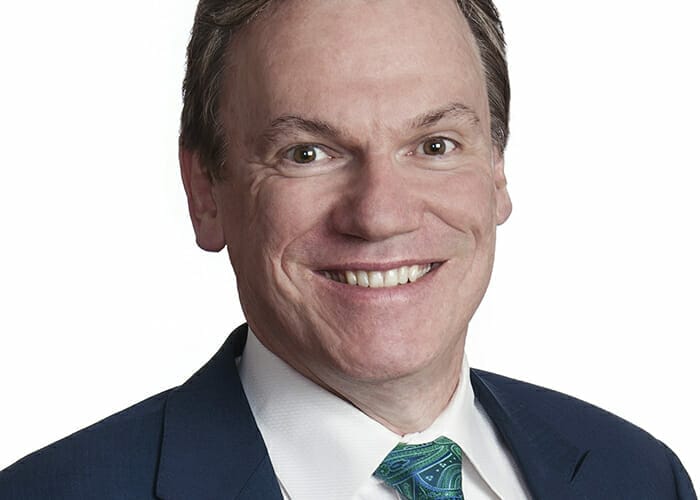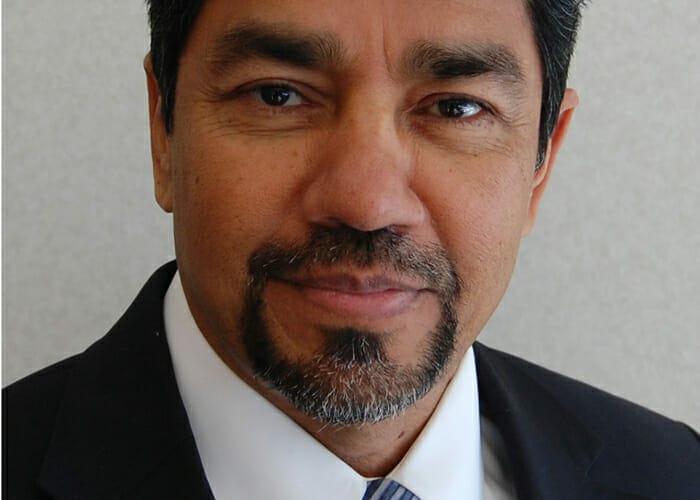James C. Davis is chief investment officer of OPTrust, one of Canada’s largest pension funds. It has assets of C$19 billion ($13.8 billion) and investment professionals located in Toronto, London and Sydney. Davis joined the fund in September 2015. He leads the organisation’s investment strategy and oversees its diversified portfolio, which spans the globe with public market, private market, infrastructure and real-estate assets in North America, Europe, developed Asia and emerging markets. He discusses the fund’s member-driven investment philosophy and how it is transforming OPTrust from an asset-management organisation into a pension-management organisation.
conexust1f.flywheelstaging.com: OPTrust has defined itself as a pension management organisation focused on risk allocation and not chasing returns. What has prompted this philosophy?
James C. Davis: Pension certainty is what matters most to our members. This means earning a sufficient return to pay pensions today and long into the future, and not jeopardising the stability of contribution rates or benefits.
Investment returns are important, but for OPTrust, the plan’s funded status is the most important measure of success. A fully funded plan ensures we are well positioned to meet our pension promise of security in retirement for our 90,000 members. Our member-driven investment (MDI) philosophy is centred around managing risk – returns are the outcome. We strive to take risk purposefully and efficiently, and to be rewarded appropriately for the risk we take, in order to earn the returns required to keep the plan sustainable for the long term. It is this careful balance of risk and return that will enable us to remain fully funded and deliver pension certainty for our members.
Can you expand on OPTrust’s member-driven investment strategy?
For any investor, a clear understanding of your objective is critical for every decision you make. At OPTrust, keeping our plan in balance – through stability and sustainability – and remaining fully funded is our singular focus. Our MDI perspective gives us a strong understanding of our liability risk profile and the returns required over a long-time horizon to meet our obligations.
MDI is more than liability-driven investing – it goes beyond mitigating the interest rate sensitivity of our liabilities. Our plan is mature and maturing; we cannot bear the same level of risk as we did 10 or 20 years ago. MDI focuses on allocating risk in the most efficient way, considering all the constraints we face, including those related to plan maturity.
MDI is transforming OPTrust from an asset-management organisation into a pension management organisation. Our focus on funded status is driving a cultural change, [generating] more alignment across asset classes and a total fund focus. Portfolio construction is playing a greater role. It’s not just about alpha anymore, it’s about total return and using risk as efficiently as possible.
As an industry, pension funds are facing challenging conditions; market volatility has become the new normal and interest rates have remained low for a prolonged period. How can investors thrive and grow with these macroeconomic challenges?
To be successful as an investor, it is important to have an edge. Competition in the markets is becoming more intense and the challenging macro-environment is making it harder to maintain an edge. At OPTrust, we are striving to build a culture that encourages innovation. Through innovation, we will be able to re-define our edge as the world around us changes.
Our size has proven to be a sustainable edge. It allows us to be nimble and to focus on mid-market deals that larger plans would overlook. We embrace complexity when it makes sense to do so. Some deals may have ‘hair’ on them, causing some investors to shy away. We have a deep private markets team that will take on the challenge of more complex deals and will structure these deals with reward-to-risk payoffs that align with our MDI objectives.
Core to OPTrust’s MDI strategy are strategic relationships. We rely on strong partnerships to show us deal flow and to provide insight. Often, when we are trying something new, we will ask our partners to challenge us. Their insight can help us [develop] a new idea into a competitive edge.
Canada’s pension funds have led the world with their approach to investing and asset allocation. OPTrust recently announced its plans to bring trading in-house. Why the move?
Internalising our capital market capabilities is a natural evolution for OPTrust, given our success with the fund’s private-markets and real-estate portfolios, which are largely managed internally.
Agility is key to the success of our MDI strategy and in-house trading will allow us to customise and diversify our investment solutions, rather than relying on third-party, off-the-shelf solutions. It goes beyond trade execution to capital efficiency, enhanced liquidity, market intelligence and direct access. Perhaps most importantly – in a challenging environment where returns are expected to be lower than ever before – costs matter. Internalising our capital markets capabilities will reduce costs.
In many ways, the internalisation of OPTrust’s capital markets activities is inextricably linked to our competitive edge of agility and innovation. The demographic profile of our members, the benefits we pay and our liabilities are unique. We believe the best way to manage risk, and keep the plan in balance, is through customisation.
The political climate around the globe is changing and we’ve seen a rise in populism. Looking forward, what impact will this have for institutional investors?
The political climate around the globe creates uncertainty. That uncertainty leads to both risks and opportunities. It means understanding the implication of economic policy changes in the US or elsewhere, anticipating how the markets will react and being prepared to take advantage of opportunities. We start from a position of balance, where we know we can weather the inevitable downturns. Beyond [that], agility and remaining liquid are probably the most important measures we can use to thrive in this environment.
Markets are quick and often overestimate and react in different ways; we have witnessed this with Brexit and the US election. Being prepared, with the right strategy in place to adjust portfolio risks based on policy changes or how the markets are priced, will continue to be core to our success.
It’s been said that technological change is disrupting economies and companies. What does innovation mean for investors and why is it so important?
The investment decision-making process will have to change to keep pace with innovation. Today, it’s not just that company A has a new product or idea that may be disruptive to an industry. Rather, it’s how our industry responds to technological change. Big data and artificial intelligence are being used to eke out an edge in investing. As such, we need to be mindful and understand how others may be exploiting and enriching their portfolios with new technology.
Innovation is not new. The steam engine, railway, telephone, commercial aviation – these were all innovative and disruptive at one point. More recently, during the dotcom era in the 1990s, it was hard to predict the winners. Instead, it was easier to target which industries were at risk and what investments to avoid. Being mindful of the potential losers and not just the companies with the newest innovations can go a long way towards improving investment performance.



